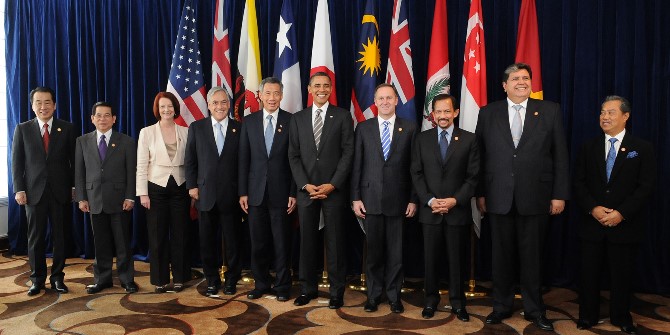
One of the most commented upon elements of the Trans-Pacific Partnership (TPP) is the inclusion of new rules around digital information flows and digital data. In particular, we have seen civil society and technology commentators criticising some of the rules within the agreement – on source code, data localisation and intermediaries – that they suggest will be detrimental to a secure, open and competitive digital sector.
What has been less discussed is the reason why these rules are part of such an agreement. We suggest that many of the problems identified so far are purely collateral damage emerging from the main goal of digital clauses of the TPP – an aim by Silicon Valley to nip in the bud the expansion of ‘digital protectionism’ (or what we prefer to call ‘digital industrial policy’!).
The emergence of digital industrial policy
It is still fashionable to describe the Internet as an ever changing entity, immune to the attempts by firms or nations to control flows. In reality, this position is becoming increasingly untenable as laws, technologies and trading rules define the ways we work and play on the web. We have seen a number of ways that nation states have become involved in shaping the Internet. For instance, national internet filters remove some information available to citizens, national trading rules define how international web firms must act before they can legitimately trade online with customers in certain countries.
Such rules are put in place to enable governments to maintain moral and political control through monitoring and censoring information. But, they are also highly effective economic tools. Take the ‘Great Firewall of China’ as an example. For sure it allows the Chinese government to prevent certain information reaching citizens but it has also been used to block certain tech firms from reaching Chinese users and the rapidly growing Chinese digital market. The emergence of Chinese internet giants like Baidu, Alibaba and Tencent comes directly as an outcome of the Great Firewall and the ability to block websites like Google and Twitter. Benefitting from such policies, these Chinese firms are moving into new digitally-driven sectors such as cloud computing, self-driving cars, image and speech recognition, robotics, and data analytics. Whilst such tactics have been most obviously applied in China, other nations such as Vietnam, Nigeria, Russia, France and Germany have also implemented rules in areas like data localisation, source code requirements and digital media rules that are partially economically driven. The EU digital single market (DSM) strategy launched in 2015 highlighted the need to make European digital firms world leaders. Speaking about the initiative, the EU commissioner for Digital Economy & Society Günther Hermann argued that: “Industry in Europe should take the lead and become a major contributor to the next generation of digital platforms that will replace today’s Web search engines, operating systems and social networks”.

As the history of industrial development shows us, industrial policy has been the bedrock of the development of many powerful sectors and nations. Governments of so-called ‘late-coming’ nations have always used a range of policy tools to protect their ‘infant industries’ from global competition and to give them space to develop skills and markets before global competition was unleashed. Industrial policy, thus, has played an important role in economic and technological catching-up processes. These historical accounts of industrial policy mirror some of the new ‘digital industrial policy’ accounts that we see happening globally.
To understand what is at stake here, we need to think about the digital transformation of the economy. Digital technologies and data are not only building new high-tech sectors, they are transforming economic activities in ‘old economy’ sectors. The competition for the future of the automotive industry, for instance, is now about automated production, data-driven transportation and self-driving models of car sharing and ownership – with companies like Google and Uber playing a key role. Similar processes can be seen in other sectors as well. The digital economy is no longer a small niche in the economy, it has important repercussions on the economic and technological competitiveness of nations.
The Silicon Valley view
Naturally, if you are a technologically-leading firm, digital industrial policy is problematic: it might block your access to fast-growing markets, as in the case China’s firewall; it can force you to invest in data centres in places that you would not otherwise invest in; it might force you to reveal your source code and technologies to governments. As such, it is no surprise that leading Silicon Valley firms, who largely dominate the digital economy, dislike such policies. They label it as ‘digital protectionism’ that should be stamped out.
There is no secret of the growing influence of tech firms in US policy. Tech firms are now some of the highest spenders in Washington through political campaigns, contributions, lobbying, and industry associations. Indeed, lobbying filings in the US show that Google alone now spends more than $15 million a year, and one of the areas in which tech firms are spending on is international trade.
The demands that Silicon Valley is delivering on international trade is simple: US digital firms are world leaders technologically, they generates income and highly-paid jobs in the US, and more importantly, they will enable the US to lead the economic and technological shifts in the coming decades. But, the international growth of ‘digital industrial policy’ is a threat to this position and the US should be pushing to discipline this behaviour.
From the US economic perspective, this argument makes sense and this message has been met with sympathetic ears in Washington. US trade policy-makers adopted the “digital trade agenda” as part of US trade policy. In 2014, Obama appointed Robert Holleyman as deputy Trade Representative. Holleyman had formerly been the CEO of digital lobbying group the Business Software Alliance and, since his appointment, he has spoken repeatedly about the need to introduce rules to limit ‘digital protectionism’.
New trade conflicts

We are witnessing the emergence of ‘digital industrial policy’ – of latecomer nations looking to economically develop their national digital capacity, skills and industries. The threat this represents to both US tech firms and the US (as the digital leading nation) mean that digital trade is now a core part of the US trade agenda. There has been lack of progress in previous multilateral trade negotiations such as reforming the WTO, and so US policy-makers have looked to integrate the digital trade agenda as part of new agreements such as the TPP and TTIP.
This signals the opening of a new area of trade conflicts. As digital technologies and data become central to all sectors in the economy, this could have negative consequences for nations with low capacity and ownership of these technologies. We believe it is important that advocates of equality and global development begin to recognise the drivers behind the digital trade agenda: how it will alter the power-centres of digital trade, and identify trade rules that limit the ability of latecomer countries to engage in digital catch-up. Such arguments, however, should not be used by governments to justify censorship and restrict internet freedom.
For more detail see new paper “The TPP and the digital trade agenda: Digital industrial policy and Silicon Valley’s influence on new trade agreements”, by Shamel Azmeh & Christopher Foster
http://www.lse.ac.uk/internationalDevelopment/publications/Working-Papers/WP175-ShamelAzmeh.aspx
Shamel Azmeh is a fellow at the Department of International Development at the London School of Economics and Political Science (LSE), c.azmeh@lse.ac.uk, twitter: @shamelazmeh
Christopher Foster is a lecturer in ICT and Innovation at the Information School at the University of Sheffield, christopher.foster@sheffield.ac.uk, twitter: @cgfoz





